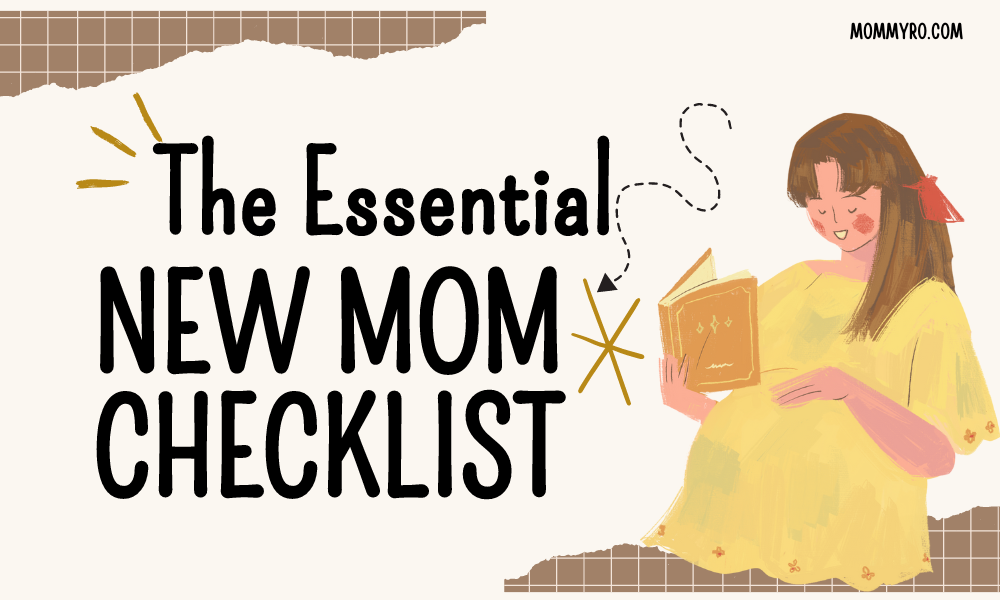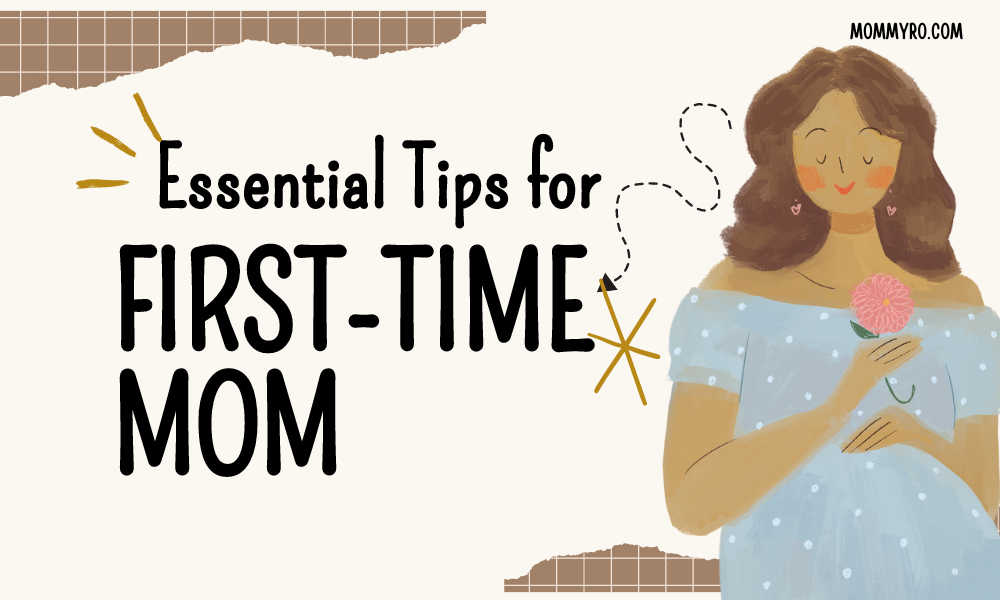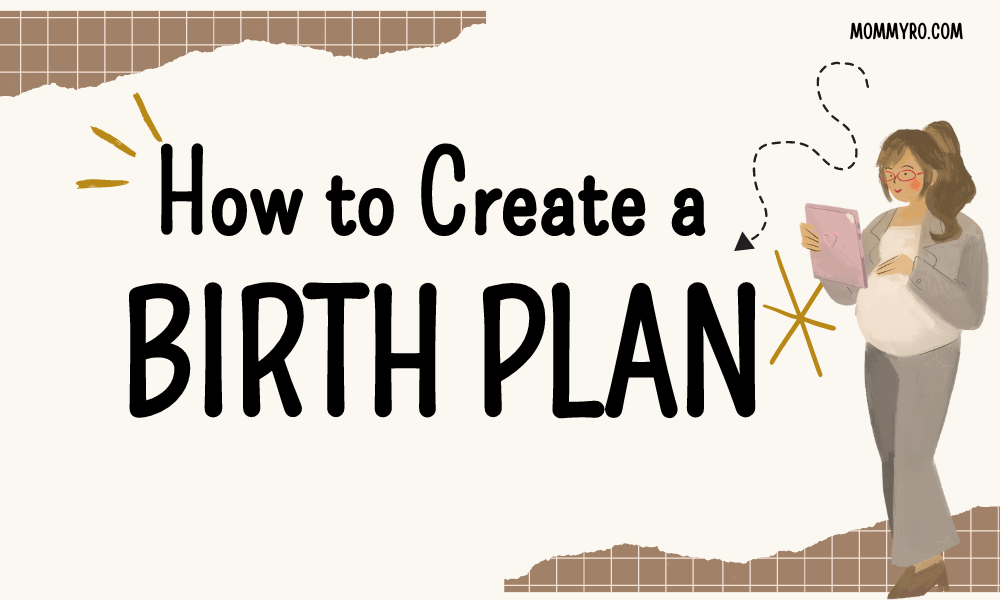The moment I found out I was pregnant, my mind started racing with all the things I needed to do, buy, and prepare for, and creating a comprehensive New Mom Checklist became my top priority.
The list seemed endless, and I was overwhelmed with worry that I was forgetting something crucial. Sound familiar?
As a new mom, I quickly realized that having a solid plan in place was key to surviving (and even thriving) in those early days of motherhood.
That’s why I’ve put together my ultimate guide to help you navigate the ups and downs of new motherhood.
From the essentials to pack in your hospital bag to the best ways to care for your newborn, I’ve got you covered. So, get comfy, and let’s dive into the ultimate guide.
(This post probably contains affiliate links. My full disclosure policy is really boring, but you can find it here.)

PREGNANCY PREPARATION

Here is the new mom checklist and essential tips for your pregnancy preparation, covering prenatal care, maintaining a healthy lifestyle, enrolling in prenatal classes, and creating your birth plan.
1. Prenatal Care
- Schedule Regular Check-Ups:
Make sure to attend all prenatal appointments as recommended by your healthcare provider.
These check-ups are essential for monitoring the health of both you and your baby throughout the pregnancy.
- Take Prenatal Vitamins:
Start taking prenatal vitamins containing folic acid as soon as you start planning for pregnancy.
These vitamins are crucial for the development of your baby’s neural tube and overall growth.
- Why is Prenatal Care Important?

According to National Institute of Child Health and Human Development, Pre-Pregnancy and prenatal care can help prevent complications and inform women about important steps they can take to protect their infant and ensure a healthy pregnancy.
2. Healthy Lifestyle

Why is it important to have a healthy lifestyle during pregnancy?
According to National Institute of Health– “The consumption of a beneficial dietary pattern before and during pregnancy is associated with a reduced risk of disorders of pregnancy, including gestational diabetes mellitus (GDM), preterm birth, obesity-related complications, and, in some populations, preeclampsia and gestational hypertension.”
Maintaining a healthy lifestyle during pregnancy is of utmost importance for both the mother and the developing baby.
By prioritizing a healthy lifestyle, expectant mothers lay the groundwork for a healthier pregnancy, childbirth, and the long-term health of their child.
– Eat a Balanced Diet:
According to Office of Disease Prevention and Health Promotion–
“When you’re pregnant, you need more of certain nutrients — like protein, iron, folic acid, iodine, and choline. It’s also important to get enough calcium, vitamin D, potassium, and fiber. Making smart food choices can help you have a healthy pregnancy and a healthy baby.”
Eating a balanced diet during pregnancy is crucial as it provides essential nutrients necessary for both the mother’s health and the proper development of the growing baby.
– Stay Hydrated:
Drink plenty of water throughout the day to support your body’s increased fluid needs during pregnancy. Aim for at least 8-10 glasses of water daily, and avoid sugary beverages and excessive caffeine.
– Get Regular Exercise:
Engage in low-impact exercises such as walking, swimming, or prenatal yoga to maintain your fitness level and promote overall well-being.
Consult with your healthcare provider before starting any new exercise routine.
– Manage Stress:
Practice relaxation techniques such as deep breathing, meditation, or prenatal massage to reduce stress and promote emotional well-being during pregnancy.
3. Educate Yourself

Take advantage of prenatal classes or educational resources to learn more about pregnancy, childbirth, and newborn care.
Knowledge empowers you to make informed decisions and feel more confident throughout your pregnancy journey.
Prenatal classes offer numerous benefits for expecting parents, including:
- Education: Comprehensive information about pregnancy, childbirth, and postpartum care.
- Preparation: Feeling more confident and prepared for labor, delivery, and parenthood.
- Empowerment: Making informed decisions about birthing preferences and healthcare options.
- Bonding: Strengthening relationships and building a supportive network.
- Community Support: Sharing experiences and emotions with others in similar situations.
- Practical Skills: Hands-on training in childbirth techniques, infant care, and more.
- Health Benefits:
According to Roots Community Birth Center– “Studies indicate that expectant parents who participated in childbirth education classes had higher rates of vaginal births and were less likely to experience a preterm birth.”
By learning about healthy practices and proper prenatal care, expectant parents can optimize their chances of having a positive birth experience and a healthy baby
4. Create a Birth Plan
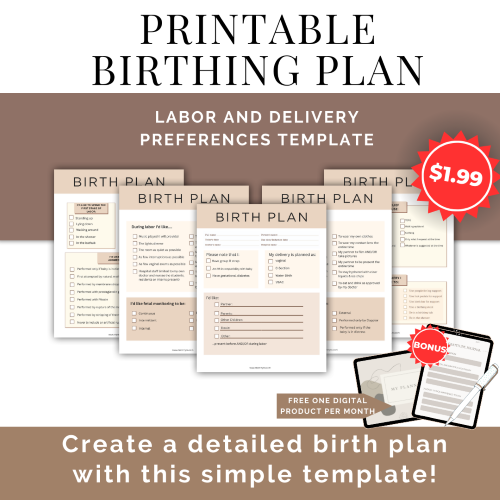
Discuss your preferences for labor and delivery with your healthcare provider and partner. Consider factors such as pain management options, birthing positions, and who you want present during labor.
Creating a birth plan can offer several benefits for expectant parents:
- Clarity and Communication: Clearly communicating preferences to healthcare providers and birthing team.
- Empowerment: Taking an active role in the birthing experience and making informed decisions.
- Reduced Anxiety: Feeling more in control and confident about labor and delivery.
- Advocacy: Advocating for oneself and the baby during labor and delivery.
- Improved Communication: Facilitating open communication with healthcare providers.
- Flexibility: Providing a framework that can be adjusted as needed.
- Enhanced Birth Experience: Contributing to a more positive and satisfying birth experience.
By creating a birth plan, expectant parents can take charge of their birthing experience and ensure that their preferences are respected.

Transform your birth experience with my meticulously crafted Birth Plan Printable Planner!
Our planner helps you take control of your birthing journey, eliminating last-minute anxieties and uncertainties. It guides you in detailing your preferences for pain management, birthing environment, and more, ensuring your voice is heard and wishes respected.
Birth with Clarity and Confidence
With beautifully designed templates and prompts, our planner makes organizing your birth plan easy and stylish, allowing you to welcome your baby with clarity, confidence, and peace of mind.
Download our Birth Plan Printable Planner today and embark on the path to the birth experience you’ve always dreamed of for only $1.99!
ALSO READ:
- The Ultimate Tips Every New Mom Need to Know About
- How to Survive the First Few Weeks With Your Newborn
- How to Build Unbreakable Bond With Your Baby
NEW MOM’S CHECKLIST: BABY ESSENTIALS

Preparing for the arrival of a new baby is an exciting time, but it can also feel overwhelming with the sheer number of baby products available.
To help expecting parents navigate this journey, I’ve compiled a new mom checklist of essential items that every baby needs:
1. Clothing:
Stock up on onesies, sleepers, socks, hats, and mittens to keep your baby cozy and comfortable.
Look for soft, breathable fabrics like cotton, and consider the weather when selecting clothing sizes.
2. Diapers and Wipes:
Whether you choose disposable or cloth diapers, make sure to have an ample supply on hand. Don’t forget to stock up on baby wipes for quick and easy clean-ups.
3. Feeding Supplies:
If you plan to breastfeed, invest in a quality breast pump, nursing bras, and nipple cream. For bottle-feeding, you’ll need bottles, nipples, formula (if not breastfeeding), and a bottle sterilizer.
4. Sleeping Essentials:
Create a safe and comfortable sleep environment for your baby with a crib, bassinet, or co-sleeper.
Don’t forget to purchase a firm mattress, fitted sheets, and lightweight blankets for swaddling.
5. Baby Gear:
Invest in essential baby gear like a car seat, stroller, baby carrier, and diaper bag. These items will make it easier to travel with your little one and keep them safe on the go.
6. Health and Safety:
Stock your medicine cabinet with baby-friendly essentials like infant acetaminophen, a nasal aspirator, thermometer, and baby-safe grooming kit.
Install baby gates, outlet covers, and cabinet locks to baby-proof your home.
7. Bath time Essentials:
Make bath time fun and enjoyable with baby-friendly bath products, a soft towel or hooded bathrobe, and a baby bathtub or bathing seat.
8. Entertainment and Development:
Stimulate your baby’s senses and encourage development with age-appropriate toys, books, and activities. Look for toys that are safe, colorful, and engaging for your little one.
Remember, every baby is different, so focus on finding products that meet your baby’s individual needs and preferences.
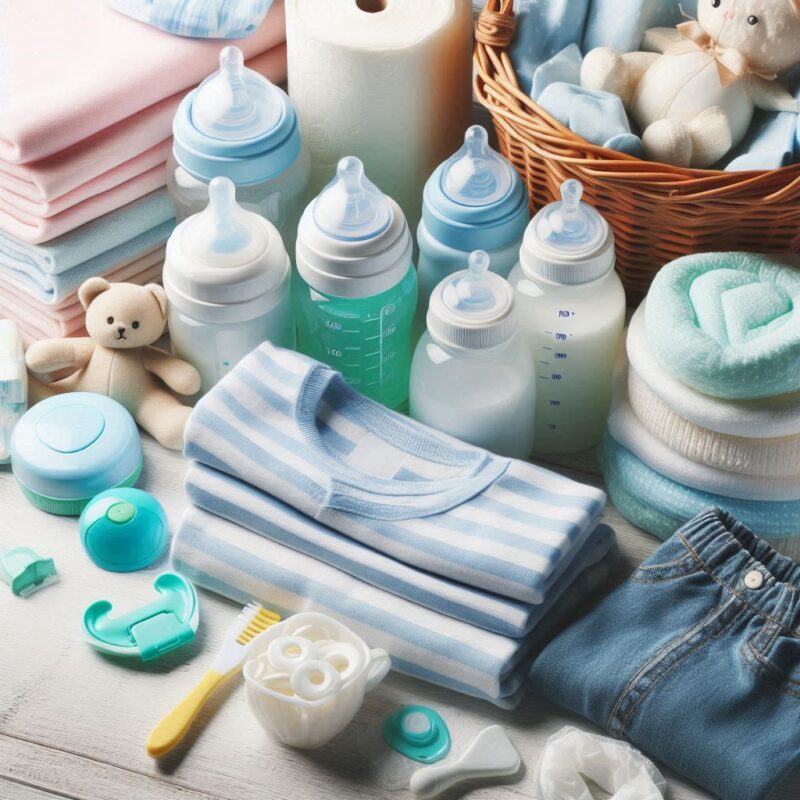
Explore my Amazon storefront, your one-stop destination for all things baby and newborn essentials.
From adorable clothing to innovative gadgets, and everything in between, discover a curated selection of top-quality products to make your parenting experience a breeze.
Don’t miss out on exclusive deals and must-have items that will make your life as a new parent easier and more enjoyable.
Click here to shop and elevate your baby’s world! 🍼✨
HOSPITAL BAG CHECKLIST

Packing your hospital bag is an important part of preparing for childbirth. Here’s a new mom checklist of essentials to include:
1. Medical Documents:
Bring your insurance information, photo ID, and any necessary hospital paperwork.
2. Comfortable Clothing:
Pack loose-fitting, comfortable clothing for yourself, including pajamas, robes, and slippers. Don’t forget extra underwear and nursing bras if you plan to breastfeed.
3. Toiletries:
Include toiletries such as toothbrush, toothpaste, shampoo, conditioner, body wash, and a hairbrush. You may also want to pack lip balm, moisturizer, and a face wash.
4. Labor and Delivery Essentials:
Bring items to help you during labor, such as a birth plan, massage tools, essential oils, a handheld fan, and snacks for energy.
5. Personal Items:
Pack personal items like your phone, charger, camera, and headphones. Consider bringing a notebook and pen to jot down important information or feelings during labor.
6. Comfort Items:
Bring comfort items from home, such as your own pillow, blanket, or music playlist. These familiar items can help you relax and feel more comfortable during your hospital stay.
7. Baby Essentials:
Pack items for your newborn, including newborn diapers, wipes, clothing, and a blanket for swaddling. Don’t forget to bring a car seat for the trip home.
8. Postpartum Care Items:
Include items for postpartum care, such as maternity pads, nursing pads, and nipple cream. You may also want to pack a peri bottle for cleaning after birth.
9. Snacks and Drinks:
Bring snacks and drinks to keep you energized during labor and recovery. Consider packing granola bars, nuts, fruit, and electrolyte drinks.
10. Entertainment:
Bring items to keep yourself entertained during downtime, such as books, magazines, or a tablet with movies or games.
11. Contact Information:
Write down important contact information, including your partner’s phone number, your doctor or midwife’s contact information, and any emergency contacts.
12. Going-Home Outfit:
Pack a comfortable outfit for yourself to wear home from the hospital.
By packing these essentials in your hospital bag, you’ll be well-prepared for your childbirth experience and the days following the birth of your baby.
Adjust the list based on your personal preferences and needs, and don’t forget to pack ahead of time to avoid last-minute stress.
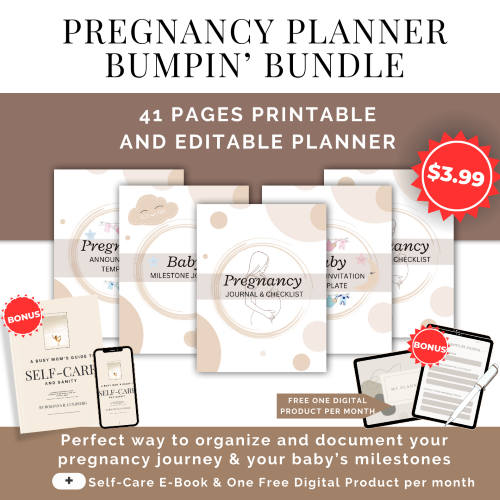
As a first-time mom, you’re probably feeling overwhelmed with everything that comes with pregnancy and preparing for your new baby.
That’s why I created this pregnancy planner and baby milestone bundle!
It includes everything you need to stay organized and on track during your pregnancy, from a pregnancy journal and checklist to a baby shower invitation and baby milestones journal.
So if you’re looking for a way to make your pregnancy journey a little easier, this bundle is perfect for you!
NEWBORN CARE CHECKLIST

Taking care of a newborn can feel overwhelming, but with some preparation and knowledge, you can navigate this exciting time with confidence.
Here are some new mom checklist and essential tips for caring for your newborn:
1. Feeding:
Whether you’re breastfeeding or formula feeding, feeding your newborn on demand is essential.
Breastfed babies typically nurse every 2-3 hours, while formula-fed babies may eat every 3-4 hours. Look for hunger cues such as rooting, sucking motions, or hand-to-mouth movements.
2. Diapering:
Newborns go through a lot of diapers, so be prepared to change them frequently—about 8-12 times a day.
Keep your baby’s diaper area clean and dry to prevent diaper rash, and apply diaper cream as needed.
3. Sleeping:
Newborns sleep a lot—usually around 16-17 hours a day—but they wake frequently to eat.
Create a safe sleep environment for your baby by placing them on their back in a crib or bassinet with a firm mattress and no loose bedding or soft objects.
4. Bathing:
According to the Mayo Clinic, “There’s no need to give your newborn baby a bath every day. Three times a week might be enough until your baby becomes more mobile. Bathing your baby too much can dry out your baby’s skin.”
Use a mild, fragrance-free baby wash and warm water, and be sure to support your baby’s head and neck during bath time.
5. Caring for the Umbilical Cord:
Until your baby’s umbilical cord stump falls off (usually within 1-3 weeks), keep the area clean and dry.
Fold diapers down to avoid covering the stump, and sponge bathe your baby until the stump falls off.
6. Bonding:
Spend plenty of time bonding with your baby through skin-to-skin contact, cuddling, and talking to them.
This helps promote emotional attachment and can soothe your baby when they’re fussy.
7. Monitoring Health:
Keep an eye on your baby’s health by monitoring their temperature, weight gain, and overall well-being.
Contact your pediatrician if you notice any signs of illness or if you have concerns about your baby’s health.
8. Seeking Support:
Don’t hesitate to reach out for support from family, friends, or healthcare professionals if you’re feeling overwhelmed or unsure about caring for your newborn.
Joining a new parents’ group or seeking advice from experienced parents can also be helpful.

🌟 Join Our Global Facebook Chat and Support Group for Moms of All Ages! 🌍👩👧👦
Connect with moms worldwide, share experiences, and seek advice in our judgment-free Facebook group. 💬 Share tips, vent about parenting, and find solidarity with fellow moms. Join us today and become part of our vibrant community of mothers supporting mothers!
Click here to join.
Let’s journey through motherhood together! 🌸💕
ALSO READ:
COMMON NEWBORN PROBLEMS

While caring for your newborn is a joyous experience, it’s also common to encounter some challenges along the way.
Here are some common newborn problems you may encounter and how to address them:
1. Jaundice:
According to MayoClinic– “Infant jaundice is yellow discoloration of a newborn baby’s skin and eyes. Infant jaundice occurs because the baby’s blood contains an excess of bilirubin (bil-ih-ROO-bin), a yellow pigment of red blood cells.”
Most cases of jaundice are mild and resolve on their own, but severe jaundice may require treatment with phototherapy or other interventions.
If you notice your baby’s skin or eyes turning yellow, contact your pediatrician.
2. Colic:
Colic is characterized by excessive crying in otherwise healthy infants, usually starting around 2-3 weeks of age and peaking around 6-8 weeks.
While the exact cause of colic is unknown, it’s believed to be related to digestive issues, overstimulation, or infant temperament.
To soothe a colicky baby, try swaddling, gentle rocking, white noise, or taking them for a walk in a stroller.
4. Reflux:
Reflux, or gastroesophageal reflux, is common in newborns and occurs when stomach contents flow back into the esophagus.
Symptoms may include spitting up, irritability, and feeding difficulties.
To manage reflux, try feeding your baby smaller, more frequent meals, keeping them upright after feedings, and using a baby wedge or elevating the head of their crib.
5. Diaper Rash:
Diaper rash is a common problem in newborns caused by irritation from urine, feces, or friction from diapers.
To prevent and treat diaper rash, change your baby’s diaper frequently, clean the diaper area gently with mild soap and water, and apply a diaper cream or ointment to protect the skin.
6. Constipation:
Constipation is uncommon in breastfed newborns but may occur in formula-fed babies or those transitioning to solid foods.
Signs of constipation include infrequent bowel movements, hard stools, and straining during bowel movements.
To relieve constipation, try giving your baby extra fluids, gentle tummy massage, or a warm bath.
7. Diaper Leaks:
Diaper leaks can occur when the diaper is not fitted properly or when it’s time to move up to a larger diaper size.
To prevent leaks, ensure that the diaper fits snugly around your baby’s legs and waist, and consider trying a different diaper brand or style if leaks persist.
8. Sleep Issues:
Newborns have irregular sleep patterns and may wake frequently during the night to eat. Establishing a consistent bedtime routine, creating a conducive sleep environment, and teaching your baby to self-soothe can help improve sleep habits over time.
If you’re unsure how to address any of these common newborn problems or if you have concerns about your baby’s health or well-being, don’t hesitate to contact your pediatrician for guidance and support.
ALSO READ:
- How to Find Joy In Motherhood
- Quotes and Words of Encouragement for New Moms
- How to Create a Birth Plan (Template Included!)
NEW MOM’S POSTPARTUM CHECKLIST

Postpartum care is crucial for new mothers as they recover from childbirth and adjust to life with a newborn. Here are some essential aspects of postpartum care:
1. Physical Recovery:
After giving birth, your body needs time to heal. Be sure to get plenty of rest, eat nutritious foods, and stay hydrated.
It’s normal to experience postpartum bleeding, known as lochia, for several weeks after childbirth.
According to Cleveland Clinic– “Lochia is dark or bright red for at least three or four days. The flow is heavy, and you may also pass small clots. You can expect to soak one thick maxi pad every two to three hours. After about a week, lochia is more watery and transitions to a pinkish brown color.”
Use sanitary pads, avoid tampons, and contact your healthcare provider if you experience heavy bleeding, severe pain, or signs of infection.
2. Perineal Care:
If you had a vaginal delivery, you may experience soreness, swelling, or stitches in the perineal area.
Use a peri bottle filled with warm water to clean the area after using the bathroom, and consider using a sitz bath to soothe discomfort.
Applying ice packs or witch hazel pads can also help reduce swelling and pain.
3. Breast Care:
If you’re breastfeeding, take care of your breasts by ensuring a proper latch, feeding frequently, and using lanolin cream or breast pads to soothe sore nipples.
Practice good hygiene, including gentle cleansing and air-drying after feeding. Wear supportive bras to provide adequate support and minimize discomfort.
If you’re not breastfeeding, wear a supportive bra to help reduce discomfort and prevent engorgement.
Seek professional help if experiencing any issues, such as engorgement or cracked nipples. Remember, taking care of your breasts is essential for both you and your baby’s well-being.
4. Emotional Well-being:
The postpartum period can be emotionally challenging as you navigate hormonal changes, sleep deprivation, and the demands of caring for a newborn.
It’s normal to experience a range of emotions, including joy, sadness, anxiety, or irritability.
Reach out to your partner, family, friends, or healthcare provider for support, and consider joining a postpartum support group or speaking with a mental health professional if you’re struggling.
5. Pelvic Floor Exercises:
Strengthening your pelvic floor muscles can help improve bladder control, support pelvic organs, and promote healing after childbirth.
Start doing Kegel exercises as soon as you feel comfortable, and gradually increase the duration and intensity over time.
6. Follow-up Care:
Attend your postpartum check-up with your healthcare provider, usually scheduled 6 weeks after childbirth.
Your provider will assess your physical and emotional well-being, address any concerns or complications, and discuss contraception options if needed.
7. Self-care:
Don’t forget to prioritize self-care amidst the demands of caring for a newborn. Take time for yourself to rest, relax, and engage in activities that bring you joy and fulfillment.
Accept help from others, delegate tasks, and focus on bonding with your baby and adjusting to your new role as a parent.
Remember, every woman’s postpartum experience is different, so listen to your body, trust your instincts, and reach out for support when needed. Taking care of yourself is essential for your well-being and the well-being of your baby.

🌟 Calling All New Moms and Busy Moms Alike! 🌟
Are you a new mom feeling overwhelmed and lost in the whirlwind of parenthood? Or a seasoned mom struggling to find time for self-care amidst the chaos of daily life?
🤱💼 Look no further! Introducing “The Busy Mom’s Guide to Self-Care and Sanity” – your lifeline to reclaiming balance and finding joy in the midst of motherhood madness. 📘✨
Whether you’re navigating the challenges of newborn care or managing the endless to-do lists of family life, this e-book has got you covered! 🌸
Discover simple yet effective strategies to prioritize your well-being, banish mommy guilt, and embrace self-love. Don’t let the demands of motherhood dim your sparkle.
Grab your copy now and embark on a journey of self-discovery and empowerment! 💖
FINAL THOUGHTS ON THE NEW MOM CHECKLIST

Mama, you’re going to crush this whole new mom thing!
I know it’s overwhelming, but with this checklist, you’re already ahead of the game. Remember, it’s okay to not have all the answers, and it’s okay to ask for help.
You’re not alone in this journey.
Take a deep breath and trust your instincts. You got this! 💕
Congratulations! You’re embarking on an amazing journey.
But let’s be honest, pregnancy and parenting can be overwhelming. There’s so much to learn, so much to do.
That’s why I created this pregnancy planner and baby milestone bundle. It’s packed with everything you need to make your pregnancy and parenting journey as smooth and stress-free as possible.
Here’s what you’ll get:
- A pregnancy journal to help you track your journey, from conception to birth.
- A checklist of everything you need to do before the baby arrives.
- A baby shower invitation that you can customize to match your style.
- A baby milestones journal to record your child’s growth and development.
- BONUS: A Busy Mom’s Guide to Self-Care and Sanity E-Book.
- BONUS: One Free Digital Product per month.
This bundle is the perfect way to stay organized and on top of things during your pregnancy and beyond. Order yours today for only $3.99!
Related Blog Posts for New Moms:
- The Ultimate Tips Every New Mom Need to Know About
- How to Survive the First Few Weeks With Your Newborn
- How to Build Unbreakable Bond With Your Baby
- Time-Saving Tips and Tricks for Busy Mothers
- Embracing Motherhood’s Changes with Confidence
- How to Find Joy In Motherhood
- Quotes and Words of Encouragement for New Moms
- How to Create a Birth Plan (Template Included!)
Like this post? Please share or PIN IT for later. You can also stay in the loop and follow me on Pinterest.

What’s on your new mom checklist that we might have missed? Share your must-haves with us!
This information is provided for educational and entertainment purposes only. We do not accept any responsibility for any liability, loss, or risk, personal or otherwise, incurred as a consequence, directly or indirectly, from any information or advice contained here. MommyRo may earn compensation from affiliate links in this content.

